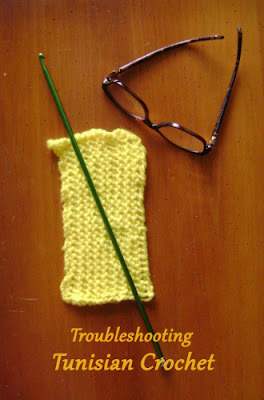I freely admit it. I have a love/hate relationship with Tunisian or afghan crochet. On the one hand, it's a fascinating, fun way to broaden your crochet horizons. On the other hand, it produces stiff, slanted, rolled-up work. Argh.
Have you found yourself asking questions like these?
- How do I keep Tunisian crochet from curling?
- How can I make Tunisian crochet that's straight?
- How do I make flexible Tunisian crochet?
The Downside
- Most standard Tunisian stitches have the same problems: the dreaded curling and slanting, which practically defy blocking.
- Tunisian crochet originally became popular for making thick, sturdy blankets, so it's not a very friendly fabric for clothing or snuggly blankets.
- There's gotta be a better way.
This Might Help
My first inclination was to try the obvious fixes. They are helpful, but they don't completely and reliably work.
- Use a larger-than-usual hook, 3-5 sizes larger than recommended on the yarn label.
- Try thinner yarn.
- Use relaxed, less springy yarn, like cotton instead of wool.
- Be sure to skip over the first vertical bar in each cast-on row.
- Don't miss the last vertical bar for your last stitch in a cast-on row. It can be hidden with the end-chain.
- Crochet a border around your work.
Dry Your Tears
With even more experimentation, I found several better ways to do Tunisian crochet.
- Forget about the traditional Tunisian or afghan stitch.
- Use the Tunisian purl stitch (my favorite).
- Use the Tunisian stockinette stitch.
 |
| Tunisian Purl Stitch |
 |
| Tunisian Stockinette Stitch |
And Now for Something Completely Different
The end result of my foray into this form of crochet was actually the development of a new type of Tunisian stitch, which doesn't curl or slant. It's a technique that I call "stacking," in which you make your new stitches above the previous row instead of in front of or behind the row. I came up with three brand-new (is anything really new?) stacked stitches.
- Stacked Tunisian stitch
- Tunisian ladders stitch
- Stacked Tunisian lace stitch
 | ||
| Stacked Tunisian Stitch |
 |
| Tunisian Ladders Stitch |
 |
| Stacked Tunisian Lace Stitch |
Stay tuned. I'll be posting tutorials on how to do these new stitches.
Get Started with Tunisian Crochet
includes a photo tutorial on the basic Tunisian stitch
Tunisian Ladder Stitch Tutorial
how to crochet the new Tunisian ladder stitch
Tunisian Purl Stitch
a photo tutorial on how to crochet the Tunisian Purl stitch
(more to come !)



Neat. Found your blog a while back. I've played with Tunisian some as a novice at this. I like Tunisian's ability to create a canvas for crewel work and cross stitching. Beyond that, I haven't been 100% wild about it, maybe precisely for reasons you pointed out, so I set learning it to the side for now.
ReplyDeleteYour images there definitely show a density difference between established stitches and what you're playing with. It's easy to imagine how that will help with the feel of the fabric as well as how it moves. Thank you *so much* for sharing your work!
Thank you for your kind words! I've read that Tunisian is good for working cross stitch on, but I haven't tried it. Keep us posted here, if you ever embroider on it.
DeleteThank you Amanda!
ReplyDeleteYou've eased my angst. I've just completed my first Tunisian crochet blanket (60" x 60")for a charity supplying blankets for orphan Rhinos, their carers and anti poaching rangers. I was so upset that it was so slanted even after blocking (which I also messed up using steam on acrylic wool). Even a border didn't help. So to find out slanting/bias is quite common, is a relief. As the blanket is required urgently for a brave ranger, I have packed it up and sent it off and hope he will excuse the weird bias but stay warm.
Clearly I need to learn a lot more before taking on such a large project 😬😜
I admire your generous blanket-making! For a nice, thick Tunisian blanket, I like to use the Tunisian purl stitch instead of regular Tunisian. Good luck with your future work!
DeleteI've never tried corner-to-corner Tunisian crochet. Interesting idea - will give it a try soon.
ReplyDelete